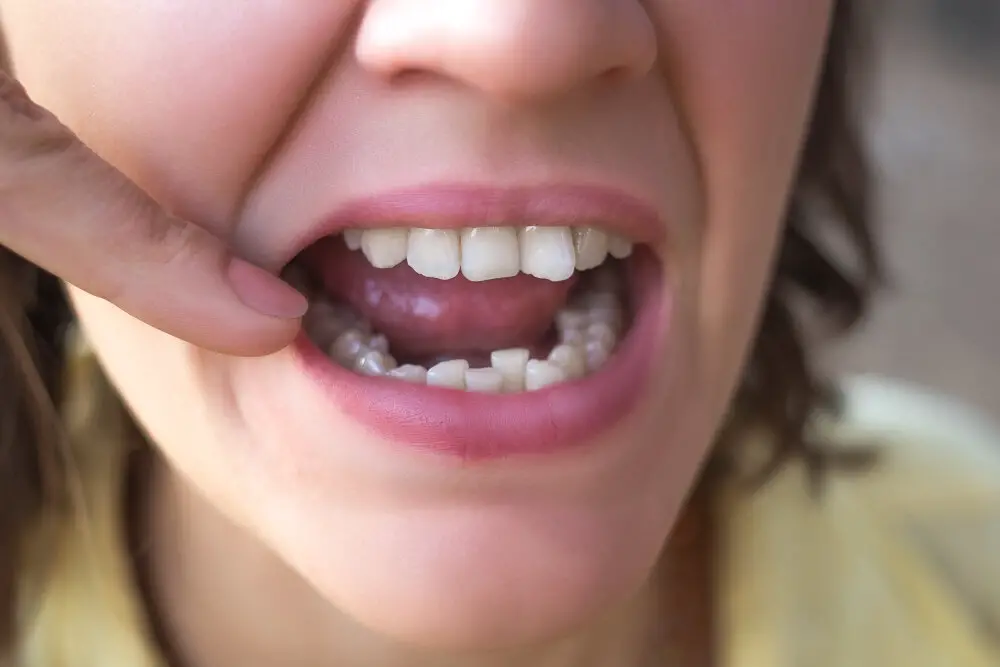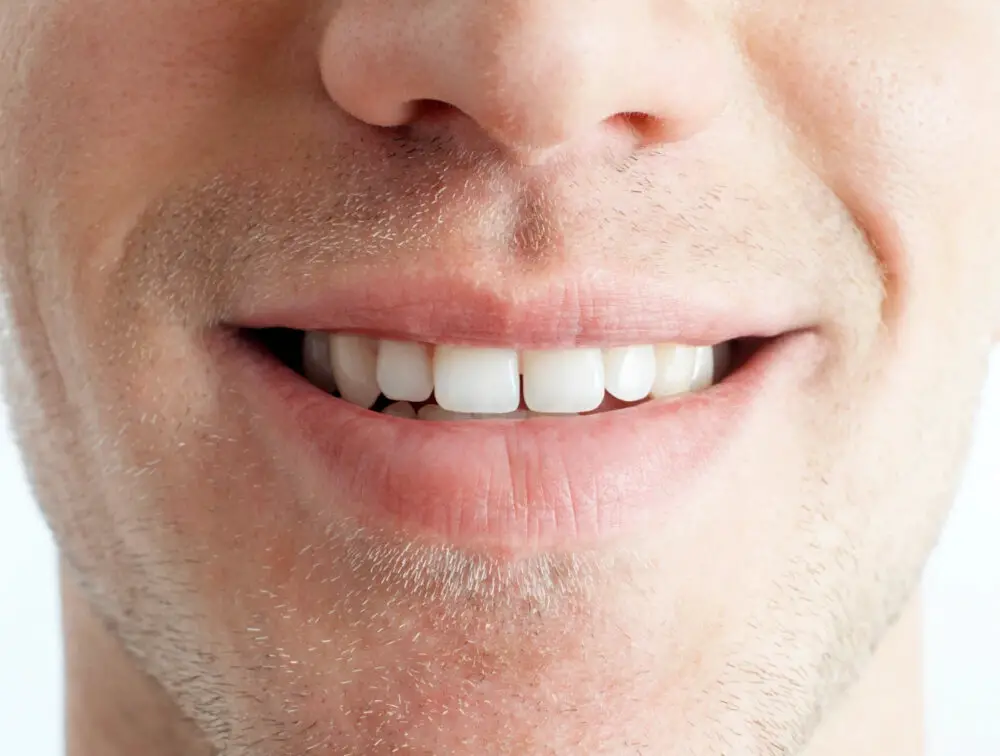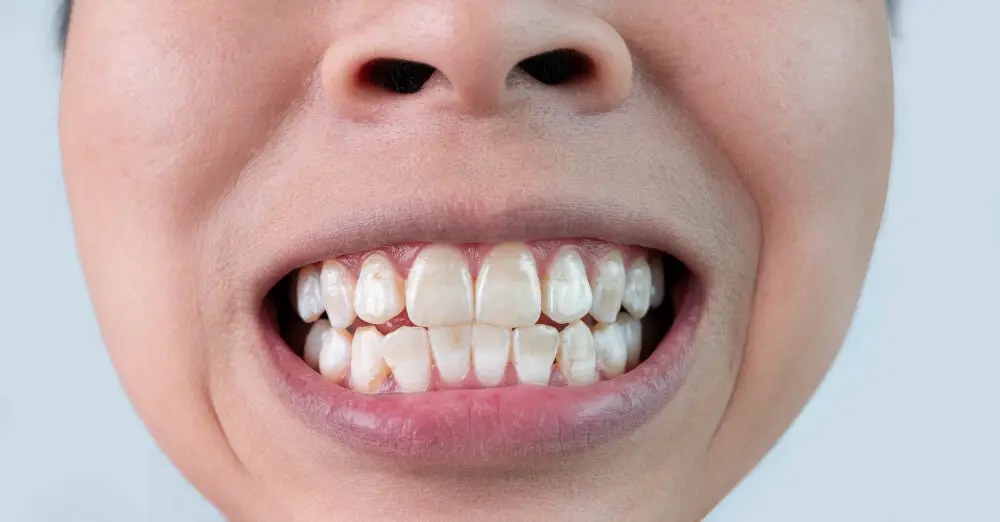The Shocking Truth: What Happens to Your Teeth If You Don’t Brush for a Week

Good oral hygiene is essential for maintaining healthy teeth and gums. Brushing your teeth twice a day is a habit that everyone should adopt. However, life can get busy, and sometimes we forget to brush our teeth. Although forgetting to brush your teeth for a day or two might not have severe consequences, what happens if you don’t brush for a week? The shocking truth is that neglecting dental hygiene can lead to severe consequences that can affect your overall health. Your mouth is home to millions of bacteria, which can accumulate and form a sticky film called plaque. If plaque is not removed, it can harden into tartar, which can lead to cavities, gum disease, and tooth loss. Neglecting to brush your teeth for a week can give the bacteria in your mouth ample time to multiply and cause havoc. Additionally, not brushing your teeth can lead to bad breath and an unsightly buildup of food particles on your teeth. If you’re curious about what happens to your teeth if you don’t brush for a week, read on to discover the shocking truth.
Maintaining good dental hygiene is crucial for overall health and well-being. Poor dental hygiene can lead to a host of problems, including bad breath, gum disease, tooth decay, and even tooth loss. Neglecting to brush your teeth for just one week can result in the buildup of plaque and tartar, which can cause irreversible damage to the teeth and gums. Additionally, poor dental hygiene has been linked to an increased risk of heart disease, stroke, and other serious health conditions. By prioritizing dental hygiene, individuals can prevent these negative consequences and enjoy a healthy, beautiful smile for years to come.
Poor dental hygiene can have a multitude of negative effects on your oral health, including bad breath, cavities, gum disease, and even tooth loss. Neglecting to brush your teeth for just a week can lead to the buildup of harmful bacteria in your mouth, which can cause plaque and tartar to form on your teeth. This can lead to cavities and tooth decay, as well as gum disease, which can cause redness, swelling, and bleeding. If left untreated, gum disease can even result in tooth loss. Additionally, poor dental hygiene can also contribute to overall health issues, such as heart disease and diabetes. Therefore, it’s important to prioritize good dental hygiene habits, such as brushing twice a day and flossing daily, to maintain optimal oral health and overall health.
Plaque Buildup

Plaque buildup is a common dental problem that can have serious consequences if left untreated. Plaque is a sticky, colorless film of bacteria that forms on the teeth and gums. It is caused by the combination of food particles and bacteria in the mouth. If plaque is not removed through regular brushing and flossing, it can harden into tartar, which is much more difficult to remove. This can lead to tooth decay, gum disease, and even tooth loss. The buildup of plaque can also lead to bad breath, as the bacteria in the plaque produce foul-smelling gases. In addition, plaque can cause inflammation and irritation of the gums, which can cause them to bleed when brushing or flossing. This can lead to a condition called gingivitis, which is the first stage of gum disease. If left untreated, gingivitis can progress to periodontitis, which is a more serious form of gum disease that can result in bone loss and tooth loss. Therefore, it is essential to maintain good dental hygiene habits to prevent the buildup of plaque and the associated dental problems.
Plaque is a sticky, colorless film of bacteria that constantly forms on the teeth and gums. It is a biofilm composed of numerous bacterial species, saliva, food particles, and other substances. Plaque formation begins when the bacteria in the mouth combine with the carbohydrates from the food and drinks we consume. As a result, the bacteria produce acid that dissolves the tooth enamel, leading to decay and cavities. Over time, the plaque buildup hardens and turns into tartar, which can only be removed by a dental professional. If left unchecked, plaque can cause gum disease, tooth loss, and other serious oral health issues. Therefore, it is crucial to brush and floss regularly to prevent plaque buildup and maintain good oral hygiene.
Plaque buildup can have several negative effects on oral health, which can lead to various dental problems. The bacteria in plaque produce acids that can erode the tooth enamel, causing tooth decay and cavities. Furthermore, the accumulation of plaque can cause gum inflammation, leading to gingivitis and eventually periodontitis, a severe gum disease that can cause tooth loss. Plaque can also cause bad breath, as the bacteria produce sulfur compounds that create an unpleasant odor. Overall, neglecting oral hygiene and allowing plaque buildup can lead to significant dental problems, which can be painful, expensive to treat, and affect overall health.
Neglecting to brush your teeth for just a week can lead to numerous long-term consequences, some of which are quite shocking. One of the most immediate results is the accumulation of plaque, which can trigger gum inflammation and bleeding. If left untreated, gum disease can cause tooth loss, bone deterioration, and even heart disease. Additionally, failing to brush your teeth regularly can result in bad breath, tooth decay, and yellowing. Over time, the buildup of bacteria can weaken tooth enamel, leading to sensitivity and an increased risk of cavities. Furthermore, poor oral hygiene has been linked to a range of health problems, including diabetes, respiratory infections, and even dementia. In short, the consequences of not brushing your teeth regularly are far-reaching and can have serious implications for your overall health and wellbeing.
Bad Breath

Bad breath, also known as halitosis, is a common problem that affects people of all ages. It can be caused by a variety of factors, including poor dental hygiene, gum disease, and certain medical conditions. When you don’t brush your teeth for a week, it can exacerbate the problem and make your breath smell even worse. This is because the bacteria in your mouth are allowed to multiply and produce sulfur compounds that give off the unpleasant odor. Additionally, the food particles that are left in your mouth can also contribute to bad breath. Without proper brushing and flossing, these particles can get stuck between your teeth and gums, creating a breeding ground for bacteria. Having bad breath can be embarrassing and can affect your social interactions and self-confidence. It can also be a sign of more serious dental issues, such as tooth decay and gum disease. When you don’t brush your teeth for a week, you are putting yourself at risk for these problems and more. It is important to maintain good dental hygiene habits, such as brushing twice a day, flossing daily, and visiting your dentist regularly, to prevent bad breath and other dental issues. By taking care of your teeth and mouth, you can ensure that you have fresh breath and a healthy smile.
The human mouth is a complex ecosystem, housing a diverse array of microorganisms, including hundreds of bacterial species. When food particles remain in the mouth, bacteria begin to feed on them, producing sulfur compounds that are responsible for bad breath. In addition, as bacteria accumulate on the teeth and gums, they form a sticky film called plaque, which can lead to gum disease and tooth decay. The longer this plaque remains, the more damage it can cause, potentially leading to tooth loss or even systemic health problems. Thus, it is crucial to maintain good oral hygiene practices, such as brushing and flossing regularly, to keep bacteria in check and prevent the buildup of harmful plaque.
Bad breath, also known as halitosis, can have a negative social impact on a person. It can make them feel self-conscious and embarrassed, causing them to withdraw from social situations. Additionally, bad breath can be a turn-off for others, causing them to avoid the person with bad breath. This can impact a person’s ability to form relationships and make friends. Furthermore, bad breath can be an indication of poor oral hygiene, which can lead to more serious dental and health issues. Thus, it is important to take care of one’s oral health to prevent bad breath and its negative social impact.
Chronic bad breath, medically known as halitosis, can be a warning sign of underlying health issues. Several factors can contribute to halitosis, including poor dental hygiene, gum disease, and dry mouth. However, in some cases, bad breath can be a symptom of more severe health problems, such as respiratory tract infections, liver or kidney disease, and even diabetes. Therefore, it is crucial to address chronic bad breath promptly and see a doctor or dentist if the problem persists.
Gum Disease

Gum disease, also known as periodontal disease, is a serious dental condition that affects the gums and bones that support the teeth. If left untreated, it can lead to tooth loss and other health problems. Gum disease is caused by a buildup of plaque and tartar on the teeth, which can irritate the gums and cause them to become inflamed. Symptoms of gum disease include bleeding gums, bad breath, and loose teeth. Gum disease is a preventable condition that can be avoided by practicing good oral hygiene. This includes brushing your teeth twice a day, flossing daily, and visiting your dentist regularly for check-ups and cleanings. If you suspect that you have gum disease, it is important to seek treatment as soon as possible to prevent further damage to your teeth and gums. Your dentist may recommend a deep cleaning, antibiotics, or surgery to treat the condition. In severe cases, tooth extraction may be necessary. Don’t let gum disease wreak havoc on your oral health – take care of your teeth and gums to ensure a healthy smile for years to come.
Gum disease, also known as periodontal disease, is a bacterial infection that affects the gums and bones supporting the teeth. It is caused by the buildup of plaque, a sticky film of bacteria that forms on teeth and gums. When plaque is not removed through proper oral hygiene practices such as brushing and flossing, it can harden into tartar and lead to inflammation and infection of the gums. As the disease progresses, the gums can recede, exposing the roots of the teeth and causing tooth loss. In severe cases, gum disease can even affect overall health, increasing the risk of heart disease, stroke, and other health issues.
Gum disease, also known as periodontal disease, is a common condition that affects the gums and bones that support the teeth. If left untreated, it can cause irreversible damage to the teeth and surrounding tissues. Gum disease can lead to a range of negative effects on oral health, including bleeding, swelling, and redness of the gums, bad breath, tooth loss, and even bone loss in severe cases. Additionally, gum disease has been linked to other health conditions, such as heart disease and diabetes. Therefore, it is crucial to maintain good oral hygiene habits, including brushing and flossing regularly, to prevent the development of gum disease and its harmful effects on overall health.
Neglecting to brush your teeth for a week can have severe long-term consequences that go beyond just bad breath and yellowing teeth. If left untreated, the buildup of plaque and tartar can lead to gum disease, tooth decay, and even tooth loss. Gum disease, also known as periodontitis, can cause inflammation and infection in the gums, leading to bone loss and tooth loss. Tooth decay occurs when the acid produced by bacteria in plaque wears down the enamel on your teeth, resulting in cavities. These issues can be painful and costly to treat, making it crucial to maintain proper oral hygiene habits to prevent them from occurring in the first place.
Tooth Decay

Tooth decay is a common issue that arises when bacteria in our mouths produce acid, which erodes the enamel and causes cavities. If left untreated, tooth decay can lead to serious oral health problems, including gum disease, tooth loss, and infection. In fact, tooth decay is one of the most prevalent health conditions worldwide, affecting millions of people of all ages each year. It’s important to take steps to prevent tooth decay, such as brushing and flossing regularly, avoiding sugary foods and drinks, and visiting the dentist for regular check-ups and cleanings. Unfortunately, if you neglect your dental hygiene for even just a week, you may start to experience the early signs of tooth decay. Your mouth is home to millions of bacteria, and without proper brushing and flossing, these bacteria can quickly grow out of control. As the bacteria feed on the sugars in the foods and drinks you consume, they produce acid that eats away at your tooth enamel. Over time, this can lead to cavities, which can cause pain, sensitivity, and even infection. To protect your teeth and prevent tooth decay, it’s essential to maintain good dental hygiene habits every day.
Tooth decay is a dental condition that results from the destruction of tooth enamel, the hard, outer layer of the tooth. It is caused by the accumulation of plaque, a sticky film of bacteria that forms on teeth. When left untreated, the bacteria in plaque produce acid that slowly erodes the enamel, leading to cavities and tooth decay. The development of tooth decay is gradual, and it can take weeks, months, or even years for a cavity to form. However, if left untreated, the decay can spread to the deeper layers of the tooth, causing pain, infection, and even tooth loss. Regular brushing and flossing, along with routine dental checkups, are essential for preventing tooth decay.
Tooth decay is a serious oral health issue that can lead to a wide range of negative effects. One of the most obvious consequences of tooth decay is the development of cavities, which can cause pain, sensitivity, and difficulty eating or drinking. Left untreated, tooth decay can also lead to gum disease, tooth loss, and even bone loss in the jaw. In addition to these physical effects, tooth decay can also have a significant impact on a person’s self-esteem and overall quality of life. Stained, damaged, or missing teeth can make it difficult to eat, speak clearly, and feel confident in social situations. It’s clear that taking care of your oral health is essential to maintaining your overall health and well-being.
Neglecting oral hygiene can lead to numerous problems, not just limited to bad breath and yellowing of teeth. Failure to brush teeth for a week can result in the buildup of plaque and tartar, which can cause gingivitis, an inflammation of the gums. If left untreated, gingivitis can progress into periodontitis, a severe form of gum disease that can cause tooth loss and bone damage. Moreover, oral bacteria can enter the bloodstream and lead to serious health issues like heart disease, stroke, and diabetes. Therefore, it is crucial to maintain proper oral hygiene to prevent any potential long-term consequences.
Neglecting your dental hygiene can have severe consequences on your overall health. Poor dental hygiene can lead to gum diseases, tooth decay, bad breath, and tooth loss. Gum diseases such as gingivitis and periodontitis can cause inflammation, bleeding gums, and eventually damage to the bones that support your teeth. Tooth decay can cause cavities, which can lead to tooth sensitivity, pain, and even tooth loss. Bad breath is another common side effect of poor dental hygiene, which can be caused by the buildup of bacteria in your mouth. In addition to these negative effects, poor dental hygiene has also been linked to an increased risk of heart disease, diabetes, and respiratory infections. Therefore, it is crucial to take care of your dental health by brushing twice a day, flossing, and visiting your dentist regularly.
Regular brushing and flossing are fundamental in maintaining good oral hygiene. Failure to do so can result in a buildup of bacteria and food particles that can cause tooth decay, gum disease, and bad breath. As highlighted in the article titled \The Shocking Truth What Happens to Your Teeth If You Don’t Brush for a Week,\ the consequences of neglecting dental care can be severe. The accumulation of plaque can harden into tartar, leading to gum inflammation and potential tooth loss. Therefore, it is crucial to brush at least twice a day and floss at least once a day to help prevent these harmful effects and maintain a healthy smile.
It’s time to prioritize your oral health! Neglecting your teeth and gums may seem like a small issue, but it can lead to significant consequences. Imagine having bad breath, yellow teeth, and bleeding gums – not to mention the potential for cavities and tooth decay. Just one week of neglecting your dental hygiene can cause irreversible damage that will require expensive treatments and cause discomfort. Don’t wait for the pain to start before taking action. Make brushing and flossing a daily habit, and schedule regular checkups with your dentist. Your smile is worth the effort!
Conclusion

In conclusion, neglecting to brush your teeth for just one week can have shocking and detrimental effects on your oral health. Plaque buildup, bad breath, gum inflammation, and even tooth decay are just some of the consequences of poor dental hygiene. It is essential to establish a consistent oral care routine, including brushing, flossing, and regular dental check-ups, to prevent long-term damage and maintain a healthy smile. Remember that your teeth are not only essential for your appearance but also for your overall health and well-being. So, take care of your teeth and make sure to prioritize your dental care routine.







